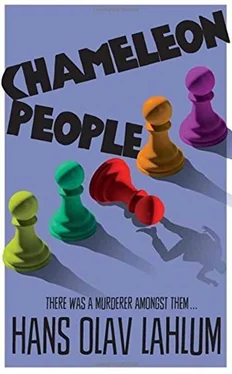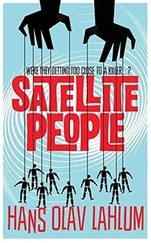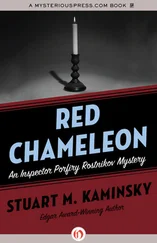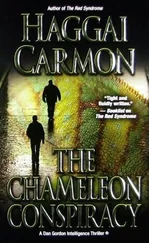I had hoped her alibis would be watertight. But they were not. It was becoming frustratingly hard to rule anyone out in this case.
I changed tack and said that there was something in connection with the company that she should perhaps know about. She nodded attentively and listened closely, leaning further across the desk as I told her the story of the office manager and the accountant. Her face was barely a ruler’s length from me, so I could see the tears when I told her that the accountant’s mother had died.
I put the confession down on the desk and said that it was up to her and her family to decide whether they wanted to report the case or not.
I had made a Photostat of the confession, in case it should prove to be relevant to the murder investigation, and I was glad that I had. Ane Line Fredriksen looked quickly at the confession, shed a couple more tears, then she produced a blue lighter from her pocket and set fire to it.
I did not try to stop her. We sat in silence and watched the confession burn.
I said with due care that the crime had taken place some time ago, but that she should at least discuss it with her brother.
‘My brother has so much to think about right now. He can concentrate on the figures and I will look after the people,’ she said, and winked almost mischievously at me.
‘It really was indecently greedy and heartless of my father. He clearly had many aspects to his personality that we, his family, did not see,’ she added quickly, with an angry shake of her head.
I said that there was one thing about her father that perhaps she should know. Again, she nodded attentively – then asked what it was, when I paused for a few seconds.
The suspicions that he was a spy were still strictly confidential. But I thought perhaps it was time to test his daughter’s reactions to the possibility that Per Johan Fredriksen had thought about changing party and sides in the EEC debate.
I did not have to wait long for her reaction. She thumped the desk with her fist and the rest of her shot up from the chair before she carried on in a very indignant voice.
‘Surely you can’t be serious? The Centre Party is one thing. But to change sides in the EEC debate would have been comparable to high treason for all concerned – including me and the rest of the family. That was the only thing we agreed on. Father came from farming stock, and knew what membership of the EEC would mean for lots of farmers. And he had been elected and re-elected to the Storting and as head of the Standing Committee on Foreign Affairs on the promise that he would oppose Norwegian membership.’
I said that all things being equal, it was apparently true. He also feared that if he did not, he would lose his seat in the Storting.
‘All the same… what an egocentric idiot, liar and political cheat. If you have no more questions for me, I have to get out into the fresh air before I throw up on your desk.’
Without waiting to hear if I had any more questions, she stood up and marched out of my office.
I thought to myself that she would hardly have behaved like this if she had killed Per Johan Fredriksen, no matter whether it was because of the inheritance or the EEC question. But it had clearly demonstrated to me that the EEC debate really could stir up strong feelings – and that Ane Line Fredriksen was a very complex person.
The day’s edition of Verdens Gang had arrived and proved to be more critical than the morning papers. ‘Despite all the respect that Detective Inspector Kolbjørn “K2” Kristiansen has earned’, there was reason to ask if more resources were not needed, as the investigation seemed to be very modest, given that both a leading politician and his daughter had been killed within the space of a few days. According to the newspaper, ‘K2’s reputation could take a nosedive’ if the investigation did not produce any concrete results before the week was out. However, the report did finish with the hope that the investigation was progressing and an expression of deepest sympathy for the victims’ family.
I had to make two telephone calls. I made the one I was looking forward to least as soon as the office door had closed behind Ane Line Fredriksen. It was to Edvard Rønning Junior, the lawyer. I got hold of him without trouble at the offices of Rønning, Rønning, Rønning & Rønning. I said that there were some developments in the case that he should be informed of, and as a result of these, some questions that I would like to ask his client, Lene Johansen.
Rønning Junior replied that he had expected to hear from me sooner, but that of course he appreciated that I had telephoned him now and that he would come in person with his client. There were certain practical problems involved in contacting his client, as she did not have a telephone or work anywhere with access to one. She did, however, ring him at three o’clock every day, and he could ask her then if she would be able come to the station with him at four. I asked him to do that, and he promised with relative goodwill to call me back if it was not possible to meet today.
Then at five to two, I called Patricia. I said that it was rather short notice, but there was a good deal of new information and I would appreciate talking to her as soon as possible.
She said that the maid should be able to rustle up some coffee with fifteen minutes’ notice.
I thanked her and said I would be there as soon as possible.
We hung up at the same time without saying any more. I thought that the case, after a hesitant start, now seemed to be of interest to Patricia. So I got up, rushed out to my car and drove to Frogner.
At a quarter past two, I was sitting in my usual place opposite Patricia in her library. Coffee, cakes and biscuits had been put out on the table, but not touched by either of us. Patricia listened in silence for twenty minutes as I told her the most important things from my meetings with Hauk Rebne Westgaard, the office manager Jørgensen and accountant Svendsen, and Ane Line Fredriksen.
‘Good work in such a short time. But for the moment, the result is in fact more potential murderers for this year’s killings, rather than fewer,’ she said briskly with some frustration.
I had to agree with that.
‘What about the hairs from 1932?’ Patricia asked.
I told her that they were head hairs, but that it was not possible to establish from whom.
Patricia sighed with frustration. ‘There really is not much help coming from anywhere in this case. Which leaves a theoretical doubt. With regards to who was in Eva’s bed just before she died, the picture is now so clear that we should confront the person directly. After today’s adventures, you no doubt know who it is?’
The challenge was unexpected. I had absolutely no idea who had been in Eva’s bed. And I could not understand how I was supposed to know after the day’s events.
I thought that it had to be either something Ane Line Fredriksen had said which revealed that it was her father, or something Hauk Rebne Westgaard had said that revealed that it was him. My guess was that it was Per Johan Fredriksen.
Patricia shook her head. It crossed my mind that no one could shake their head with such mild condescension and captivating arrogance as Patricia. She grabbed a pen and wrote something down on her notepad, which she kept hidden behind her coffee cup.
‘It is sometimes alarming to discover what conservative mental barriers even relatively young and enlightened people can set for themselves in this day and age,’ she said with a mocking smile as she held up the piece of paper.
I stared at it and immediately forgave Patricia for mocking me. I had to agree that even relatively young and enlightened people in 1972 could still have conservative mental blocks. And that I should have worked this out on the basis of what I had heard earlier, if not before that.
Читать дальше












